- Home
- Lewis Carroll
Through the Looking Glass Page 6
Through the Looking Glass Read online
Page 6
“What a beautiful belt you've got on!” Alice suddenly remarked.
(They had had quite enough of the subject of age, she thought: and if they really were to take turns in choosing subjects, it was her turn now.) “At least,” she corrected herself on second thoughts, “a beautiful cravat, I should have said—no, a belt, I mean—I beg your pardon!” she added in dismay, for Humpty Dumpty looked thoroughly offended, and she began to wish she hadn't chosen that subject. “If I only knew,” the thought to herself, 'which was neck and which was waist!”
Evidently Humpty Dumpty was very angry, though he said nothing for a minute or two. When he DID speak again, it was in a deep growl.
“It is a—MOST—PROVOKING—thing,” he said at last, “when a person doesn't know a cravat from a belt!”
“I know it's very ignorant of me,” Alice said, in so humble a tone that Humpty Dumpty relented.
“It's a cravat, child, and a beautiful one, as you say. It's a present from the White King and Queen. There now!”
“Is it really?” said Alice, quite pleased to find that she HAD chosen a good subject, after all.
“They gave it me,” Humpty Dumpty continued thoughtfully, as he crossed one knee over the other and clasped his hands round it, “they gave it me—for an un-birthday present.”
“I beg your pardon?” Alice said with a puzzled air.
“I'm not offended,” said Humpty Dumpty.
“I mean, what IS an un-birthday present?”
“A present given when it isn't your birthday, of course.”
Alice considered a little. “I like birthday presents best,” she said at last.
“You don't know what you're talking about!” cried Humpty Dumpty. “How many days are there in a year?”
“Three hundred and sixty-five,” said Alice.
“And how many birthdays have you?”
“One.”
“And if you take one from three hundred and sixty-five, what remains?”
“Three hundred and sixty-four, of course.”
Humpty Dumpty looked doubtful. “I'd rather see that done on paper,” he said.
Alice couldn't help smiling as she took out her memorandum- book, and worked the sum for him:
365
- 1
___
364
Humpty Dumpty took the book, and looked at it carefully. “That seems to be done right—” he began.
“You're holding it upside down!” Alice interrupted.
“To be sure I was!” Humpty Dumpty said gaily, as she turned it round for him. “I thought it looked a little queer. As I was saying, that SEEMS to be done right—though I haven't time to look it over thoroughly just now—and that shows that there are three hundred and sixty-four days when you might get un-birthday presents—”
“Certainly,” said Alice.
“And only ONE for birthday presents, you know. There's glory for you!”
“I don't know what you mean by “glory,"“ Alice said.
Humpty Dumpty smiled contemptuously. “Of course you don't— till I tell you. I meant “there's a nice knock-down argument for you!"“
“But “glory” doesn't mean “a nice knock-down argument,"“ Alice objected.
“When I use a word,” Humpty Dumpty said in rather a scornful tone, “it means just what I choose it to mean—neither more nor less.”
“The question is,” said Alice, “whether you CAN make words mean so many different things.”
“The question is,” said Humpty Dumpty, “which is to be master— that's all.”
Alice was too much puzzled to say anything, so after a minute Humpty Dumpty began again. “They've a temper, some of them— particularly verbs, they're the proudest—adjectives you can do anything with, but not verbs—however, I can manage the whole lot of them! Impenetrability! That's what I say!”
“Would you tell me, please,” said Alice “what that means?”
“Now you talk like a reasonable child,” said Humpty Dumpty, looking very much pleased. “I meant by “impenetrability” that we've had enough of that subject, and it would be just as well if you'd mention what you mean to do next, as I suppose you don't mean to stop here all the rest of your life.”
“That's a great deal to make one word mean,” Alice said in a thoughtful tone.
“When I make a word do a lot of work like that,” said Humpty Dumpty, “I always pay it extra.”
“Oh!” said Alice. She was too much puzzled to make any other remark.
“Ah, you should see 'em come round me of a Saturday night,” Humpty Dumpty went on, wagging his head gravely from side to side: “for to get their wages, you know.”
(Alice didn't venture to ask what he paid them with; and so you see I can't tell YOU.)
“You seem very clever at explaining words, Sir,” said Alice. “Would you kindly tell me the meaning of the poem called “Jabberwocky”?”
“Let's hear it,” said Humpty Dumpty. “I can explain all the poems that were ever invented—and a good many that haven't been invented just yet.”
This sounded very hopeful, so Alice repeated the first verse:
'Twas brillig, and the slithy toves
Did gyre and gimble in the wabe;
All mimsy were the borogoves,
And the mome raths outgrabe.
“That's enough to begin with,” Humpty Dumpty interrupted: “there are plenty of hard words there. “BRILLIG” means four o'clock in the afternoon—the time when you begin BROILING things for dinner.”
“That'll do very well,” said Alice: and “SLITHY”?”
“Well, “SLITHY” means “lithe and slimy.” “Lithe” is the same as “active.” You see it's like a portmanteau—there are two meanings packed up into one word.”
“I see it now,” Alice remarked thoughtfully: “and what are “TOVES”?”
“Well, “TOVES” are something like badgers—they're something like lizards—and they're something like corkscrews.”
“They must be very curious looking creatures.”
“They are that,” said Humpty Dumpty: “also they make their nests under sun-dials—also they live on cheese.”
“Andy what's the “GYRE” and to “GIMBLE”?”
“To “GYRE” is to go round and round like a gyroscope. To “GIMBLE” is to make holes like a gimlet.”
“And “THE WABE” is the grass-plot round a sun-dial, I suppose?” said Alice, surprised at her own ingenuity.
“Of course it is. It's called “WABE,” you know, because it goes a long way before it, and a long way behind it—”
“And a long way beyond it on each side,” Alice added.
“Exactly so. Well, then, “MIMSY” is “flimsy and miserable” (there's another portmanteau for you). And a “BOROGOVE” is a thin shabby-looking bird with its feathers sticking out all round— something like a live mop.”
“And then “MOME RATHS”?” said Alice. “I'm afraid I'm giving you a great deal of trouble.”
“Well, a “RATH” is a sort of green pig: but “MOME” I'm not certain about. I think it's short for “from home"—meaning that they'd lost their way, you know.”
“And what does “OUTGRABE” mean?”
“Well, “OUTGRABING” is something between bellowing and whistling, with a kind of sneeze in the middle: however, you'll hear it done, maybe—down in the wood yonder—and when you've once heard it you'll be QUITE content. Who's been repeating all that hard stuff to you?”
“I read it in a book,” said Alice. “But I had some poetry repeated to me, much easier than that, by—Tweedledee, I think it was.”
“As to poetry, you know,” said Humpty Dumpty, stretching out one of his great hands, “I can repeat poetry as well as other folk, if it comes to that—”
“Oh, it needn't come to that!” Alice hastily said, hoping to keep him from beginning.
“The piece I'm going to repeat,” he went on without noticing her remark,” was written entirely for yo
ur amusement.”
Alice felt that in that case she really OUGHT to listen to it, so she sat down, and said “Thank you” rather sadly.
“In winter, when the fields are white,
I sing this song for your delight—
only I don't sing it,” he added, as an explanation.
“I see you don't,” said Alice.
“If you can SEE whether I'm singing or not, you've sharper eyes than most.” Humpty Dumpty remarked severely. Alice was silent.
“In spring, when woods are getting green,
I'll try and tell you what I mean.”
“Thank you very much,” said Alice.
“In summer, when the days are long,
Perhaps you'll understand the song:
In autumn, when the leaves are brown,
Take pen and ink, and write it down.”
“I will, if I can remember it so long,” said Alice.
“You needn't go on making remarks like that,” Humpty Dumpty said: “they're not sensible, and they put me out.”
“I sent a message to the fish:
I told them “This is what I wish.”
The little fishes of the sea,
They sent an answer back to me.
The little fishes” answer was
“We cannot do it, Sir, because—"“
“I'm afraid I don't quite understand,” said Alice.
“It gets easier further on,” Humpty Dumpty replied.
“I sent to them again to say
“It will be better to obey.”
The fishes answered with a grin,
“Why, what a temper you are in!”
I told them once, I told them twice:
They would not listen to advice.
I took a kettle large and new,
Fit for the deed I had to do.
My heart went hop, my heart went thump;
I filled the kettle at the pump.
Then some one came to me and said,
“The little fishes are in bed.”
I said to him, I said it plain,
“Then you must wake them up again.”
I said it very loud and clear;
I went and shouted in his ear.”
Humpty Dumpty raised his voice almost to a scream as he repeated this verse, and Alice thought with a shudder, “I wouldn't have been the messenger for ANYTHING!”
“But he was very stiff and proud;
He said “You needn't shout so loud!”
And he was very proud and stiff;
He said “I'd go and wake them, if—”
I took a corkscrew from the shelf:
I went to wake them up myself.
And when I found the door was locked,
I pulled and pushed and kicked and knocked.
And when I found the door was shut,
I tried to turn the handle, but—”
There was a long pause.
“Is that all?” Alice timidly asked.
“That's all,” said Humpty Dumpty. “Good-bye.”
This was rather sudden, Alice thought: but, after such a VERY strong hint that she ought to be going, she felt that it would hardly be civil to stay. So she got up, and held out her hand. “Good-bye, till we meet again!” she said as cheerfully as she could.
“I shouldn't know you again if we DID meet,” Humpty Dumpty replied in a discontented tone, giving her one of his fingers to shake; “you're so exactly like other people.”
“The face is what one goes by, generally,” Alice remarked in a thoughtful tone.
“That's just what I complain of,” said Humpty Dumpty. “Your face is the same as everybody has—the two eyes, so—” (marking their places in the air with this thumb) “nose in the middle, mouth under. It's always the same. Now if you had the two eyes on the same side of the nose, for instance—or the mouth at the top—that would be SOME help.”
“It wouldn't look nice,” Alice objected. But Humpty Dumpty only shut his eyes and said “Wait till you've tried.”
Alice waited a minute to see if he would speak again, but as he never opened his eyes or took any further notice of her, she said “Good-bye!” once more, and, getting no answer to this, she quietly walked away: but she couldn't help saying to herself as she went, “Of all the unsatisfactory—” (she repeated this aloud, as it was a great comfort to have such a long word to say) “of all the unsatisfactory people I EVER met—” She never finished the sentence, for at this moment a heavy crash shook the forest from end to end.
Chapter VII
THE LION AND THE UNICORN
The next moment soldiers came running through the wood, at first in twos and threes, then ten or twenty together, and at last in such crowds that they seemed to fill the whole forest. Alice got behind a tree, for fear of being run over, and watched them go by.
She thought that in all her life she had never seen soldiers so uncertain on their feet: they were always tripping over something or other, and whenever one went down, several more always fell over him, so that the ground was soon covered with little heaps of men.
Then came the horses. Having four feet, these managed rather better than the foot-soldiers: but even THEY stumbled now and then; and it seemed to be a regular rule that, whenever a horse stumbled the rider fell off instantly. The confusion got worse every moment, and Alice was very glad to get out of the wood into an open place, where she found the White King seated on the ground, busily writing in his memorandum-book.
“I've sent them all!” the King cried in a tone of delight, on seeing Alice. “Did you happen to meet any soldiers, my dear, as you came through the wood?”
“Yes, I did,” said Alice: “several thousand, I should think.”
“Four thousand two hundred and seven, that's the exact number,” the King said, referring to his book. “I couldn't send all the horses, you know, because two of them are wanted in the game. And I haven't sent the two Messengers, either. They're both gone to the town. Just look along the road, and tell me if you can see either of them.”
“I see nobody on the road,” said Alice.
“I only wish I had such eyes,” the King remarked in a fretful tone. “To be able to see Nobody! And at that distance, too! Why, it's as much as I can do to see real people, by this light!”
All this was lost on Alice, who was still looking intently along the road, shading her eyes with one hand. “I see somebody now!” she exclaimed at last. “But he's coming very slowly—and what curious attitudes he goes into!” (For the messenger kept skipping up and down, and wriggling like an eel, as he came along, with his great hands spread out like fans on each side.)
“Not at all,” said the King. “He's an Anglo-Saxon Messenger— and those are Anglo-Saxon attitudes. He only does them when he's happy. His name is Haigha.” (He pronounced it so as to rhyme with “mayor.')
“I love my love with an H,” Alice couldn't help beginning, “because he is Happy. I hate him with an H, because he is Hideous. I fed him with—with—with Ham-sandwiches and Hay. His name is Haigha, and he lives—”
“He lives on the Hill,” the King remarked simply, without the least idea that he was joining in the game, while Alice was still hesitating for the name of a town beginning with H. “The other Messenger's called Hatta. I must have TWO, you know—to come and go. Once to come, and one to go.”
“I beg your pardon?” said Alice.
“It isn't respectable to beg,” said the King.
“I only meant that I didn't understand,” said Alice. “Why one to come and one to go?”
“Didn't I tell you?” the King repeated impatiently. “I must have Two—to fetch and carry. One to fetch, and one to carry.”
At this moment the Messenger arrived: he was far too much out of breath to say a word, and could only wave his hands about, and make the most fearful faces at the poor King.
“This young lady loves you with an H,” the King said, introducing Alice in the hope of turning off the Messenger's attention from himself—
but it was no use—the Anglo-Saxon attitudes only got more extraordinary every moment, while the great eyes rolled wildly from side to side.
“You alarm me!” said the King. “I feel faint—Give me a ham sandwich!”
On which the Messenger, to Alice's great amusement, opened a bag that hung round his neck, and handed a sandwich to the King, who devoured it greedily.
“Another sandwich!” said the King.
“There's nothing but hay left now,” the Messenger said, peeping into the bag.
“Hay, then,” the King murmured in a faint whisper.
Alice was glad to see that it revived him a good deal. “There's nothing like eating hay when you're faint,” he remarked to her, as he munched away.
“I should think throwing cold water over you would be better,” Alice suggested: “or some sal-volatile.”
“I didn't say there was nothing BETTER,” the King replied. “I said there was nothing LIKE it.” Which Alice did not venture to deny.
“Who did you pass on the road?” the King went on, holding out his hand to the Messenger for some more hay.
“Nobody,” said the Messenger.
“Quite right,” said the King: “this young lady saw him too. So of course Nobody walks slower than you.”
“I do my best,” the Messenger said in a sulky tone. “I'm sure nobody walks much faster than I do!”
“He can't do that,” said the King, “or else he'd have been here first. However, now you've got your breath, you may tell us what's happened in the town.”
“I'll whisper it,” said the Messenger, putting his hands to his mouth in the shape of a trumpet, and stooping so as to get close to the King's ear. Alice was sorry for this, as she wanted to hear the news too. However, instead of whispering, he simply shouted at the top of his voice “They're at it again!”
“Do you call THAT a whisper?” cried the poor King, jumping up and shaking himself. “If you do such a thing again, I'll have you buttered! It went through and through my head like an earthquake!”
“It would have to be a very tiny earthquake!” thought Alice. “Who are at it again?” she ventured to ask.

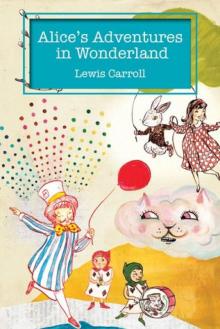 Alice's Adventures in Wonderland & Through the Looking-Glass
Alice's Adventures in Wonderland & Through the Looking-Glass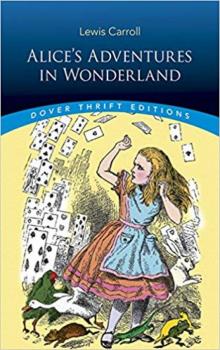 Alice's Adventures in Wonderland
Alice's Adventures in Wonderland O Frabjous Day!
O Frabjous Day!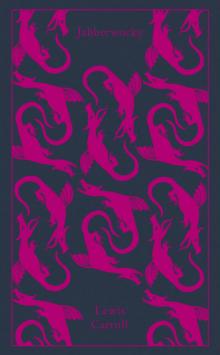 Jabberwocky and Other Nonsense
Jabberwocky and Other Nonsense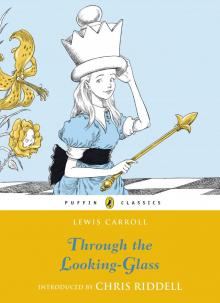 Through the Looking-Glass and What Alice Found There
Through the Looking-Glass and What Alice Found There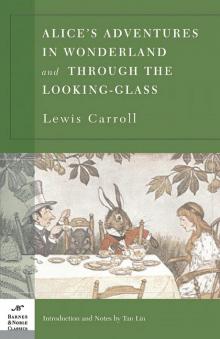 Alice's Adventures in Wonderland and Through the Looking Glass (B&N)
Alice's Adventures in Wonderland and Through the Looking Glass (B&N)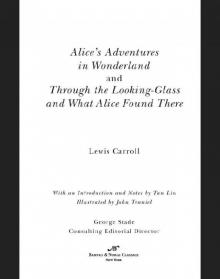 Alice's Adventures in Wonderland and Through the Looking Glass (Barnes & Noble Cla
Alice's Adventures in Wonderland and Through the Looking Glass (Barnes & Noble Cla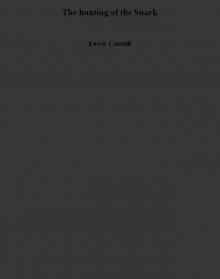 The hunting of the Snark
The hunting of the Snark The Complete Alice in Wonderland (Wonderland Imprints Master Editions)
The Complete Alice in Wonderland (Wonderland Imprints Master Editions) Alice in Wonderland: The Vampire Slayer
Alice in Wonderland: The Vampire Slayer Phantasmagoria and Other Poems
Phantasmagoria and Other Poems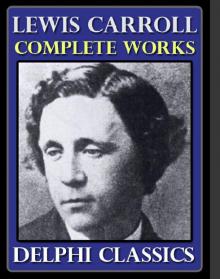 Complete Works of Lewis Carroll
Complete Works of Lewis Carroll Alice's Adventures in Wonderland illustrated
Alice's Adventures in Wonderland illustrated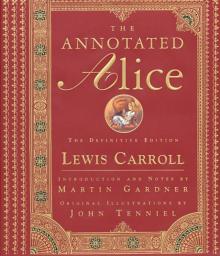 The Annotated Alice: The Definitive Edition (The Annotated Books)
The Annotated Alice: The Definitive Edition (The Annotated Books) Through the Looking Glass
Through the Looking Glass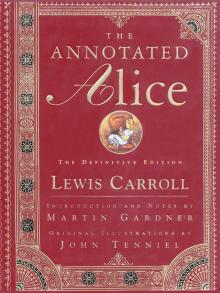 The Annotated Alice
The Annotated Alice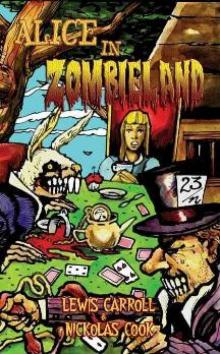 Alice in Zombieland
Alice in Zombieland